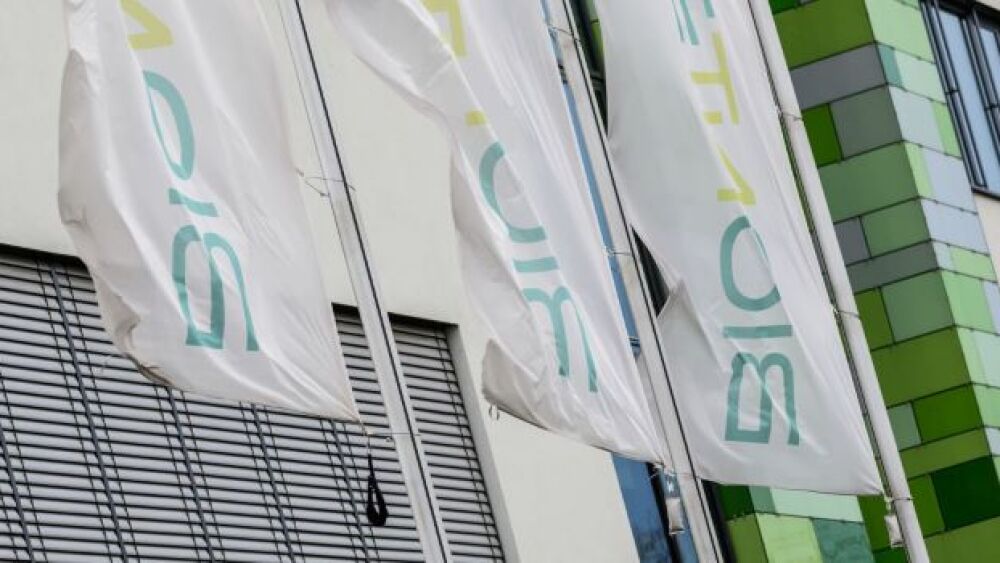The science community is aware of the effectiveness of the mRNA vaccines developed by Moderna and Pfizer-BioNTech. Now, they may be using that technology to treat cancer.
Andreas Arnold/picture alliance via Getty
By now, everyone in the science community is aware of the effectiveness of the messenger RNA (mRNA) vaccines developed by Moderna and Pfizer-BioNTech. Moderna and BioNTech are the big leaders in the field of infectious diseases, but Moderna has also been focusing on cancer therapeutics. An even larger segment of BioNTech’s mRNA programs are focused on cancer, and they just made a major step in that direction.
At the Clinical Trials Plenary Session at the 2022 AACR Annual Meeting this weekend, Dr. John Haanen, M.D., Ph.D., of the Netherlands Cancer Institute (NCI) in Amsterdam, Netherlands, presented data from BioNTech’s ongoing first-in-human Phase I/II trial of its CAR-T cell therapy, BNT211, in patients with advanced solid tumors.
CAR T is short for chimeric antigen receptor T cells. The process involves collecting immune cells from the patient, engineering them in the laboratory to attack cancer cells, then infusing them back into the patient, where they grow and fight cancer. It’s been very successful in blood cancers, but much less so in solid cancers.
BNT211 is made up of two drug products: an autologous CAR-T cell therapy that targets the oncofetal antigen Claudin-6 (CLDN6) and a CLDN6-encoding CAR-T cell amplifying RNA vaccine (CARVac), which leverages BioNTech’s mRNA-lipoplex technology. The presentation Haanen gave included data from 16 patients who received the therapy, some with just the CLDN6 CAR-T and some combined with CARVac.
The tumor indications included testicular cancer, ovarian cancer, endometrial cancer, fallopian tube cancer, sarcoma and gastric cancer. Both cohorts showed the therapy was well tolerated and demonstrated encouraging indications of clinical activity. Some cytokine release syndrome was observed but apparently were manageable. There were mild indications of pancreatic toxicity.
The first assessment six weeks after infusion showed 6 of 14 evaluable patients had a partial response, and 5 had stable disease with their target lesions shrinking. One patient showed no change, and two patients were progressing. All four testicular cancer patients in the higher dose level demonstrated disease control and three showed objective responses, with one showing partial response after receiving the lowest CAR-T dose. Two patients with ovarian cancer demonstrated responses.
“Seeing first anti-tumor effects even at the lowest CAR-T cell dose in this heavily pre-treated patient population is truly remarkable and points to the potential of our CAR design and our CARVac approach,” said Dr. Ozlem Tureci, M.D., co-founder and chief medical officer of BioNTech.
In addition to being good news for BioNTech, it’s a good proof-of-concept for mRNA technology outside the field of infectious diseases. BioNTech has programs outside of COVID-19 for infectious diseases, including for shingles, malaria, tuberculosis, HSV and HIV. But its oncology program is extensive as well, with at least five programs in Phase II and about a dozen in Phase I covering pancreatic cancer, non-small cell lung cancer, colorectal cancer, melanoma, HPV16+ head and neck cancer, prostate cancer and other solid tumors.
Similarly, Moderna has infectious disease programs ongoing for cytomegalovirus, HSV, Zika, Nipah, RSV, flu and others. But it is also developing mRNA therapeutics for autoimmune disorders and cancer, including a personalized cancer vaccine (mRNA-4157), a KRAS vaccine (mRNA-5671), a checkpoint vaccine (mRNA-4359) and many others in the cancer space.
As recently as 2010, Bancel was skeptical of the mRNA technology, saying that “It’s impossible.” Then he took the lead with the company in 2011. Overall, scientists viewed mRNA-based therapies as intriguing and exciting, but a very long way from being viable. Many thought that the reason the companies involved in this area focused on infectious disease vaccines was it was “low-hanging fruit,” much more likely to be possible than more complex diseases such as cancer.
Speaking about his presentation at AACR, Haanen said, “I was quite skeptical at first because CAR T-therapy hadn’t worked before in solid tumors, so we were very excited to see how the metastases disappeared and the patients improved. These patients had a wonderful partial response, and one patient had a complete remission that is still ongoing, lasting now for almost six months.”
Despite the promise in cancer, it’s still very early and the study population is quite small. There weren’t signs of severe toxicity in the trial, but when they move into larger studies that is a potential problem, especially because in the smaller study there were some indications of pancreatic toxicity. Haanen noted, “We don’t know what would happen if we treat patients with a higher dose. That is something we still have to learn.”
Other research is working to make CAR T work for other indications besides cancer — not just in hematological cancers, where it is quite successful, but in solid tumors, and in other indications. For example, research was published in January on using CAR T to recognize and treat scarring in the heart. Researchers at the University of Pennsylvania injected CD5-targeting lipid nanoparticles containing the mRNA instructions to reprogram T lymphocytes, which created CAR T cells inside the body. In a mouse model of heart disease, the approach successfully decreased fibrosis and restored cardiac function.
“Fibrosis underlies many serious disorders, including heart failure, liver disease, and kidney failure, and this technology could turn out to be a scalable and affordable way to address an enormous medical burden,” said senior author Dr. Jonathan A. Epstein, M.D., chief scientific officer for Penn Medicine, and executive vice dean and the William Wikoff Smith Professor of Cardiovascular Research in the Perelman School of Medicine. “But the most notable advancement is the ability to engineer T cells for a specific clinical application without having to take them out of the patient’s body.”
mRNA has dazzled in its effectiveness against COVID-19, and it’s likely a small step from there to developing vaccines against other viruses. BioNTech’s research is a single very large step toward demonstrating its value for treating other diseases.





